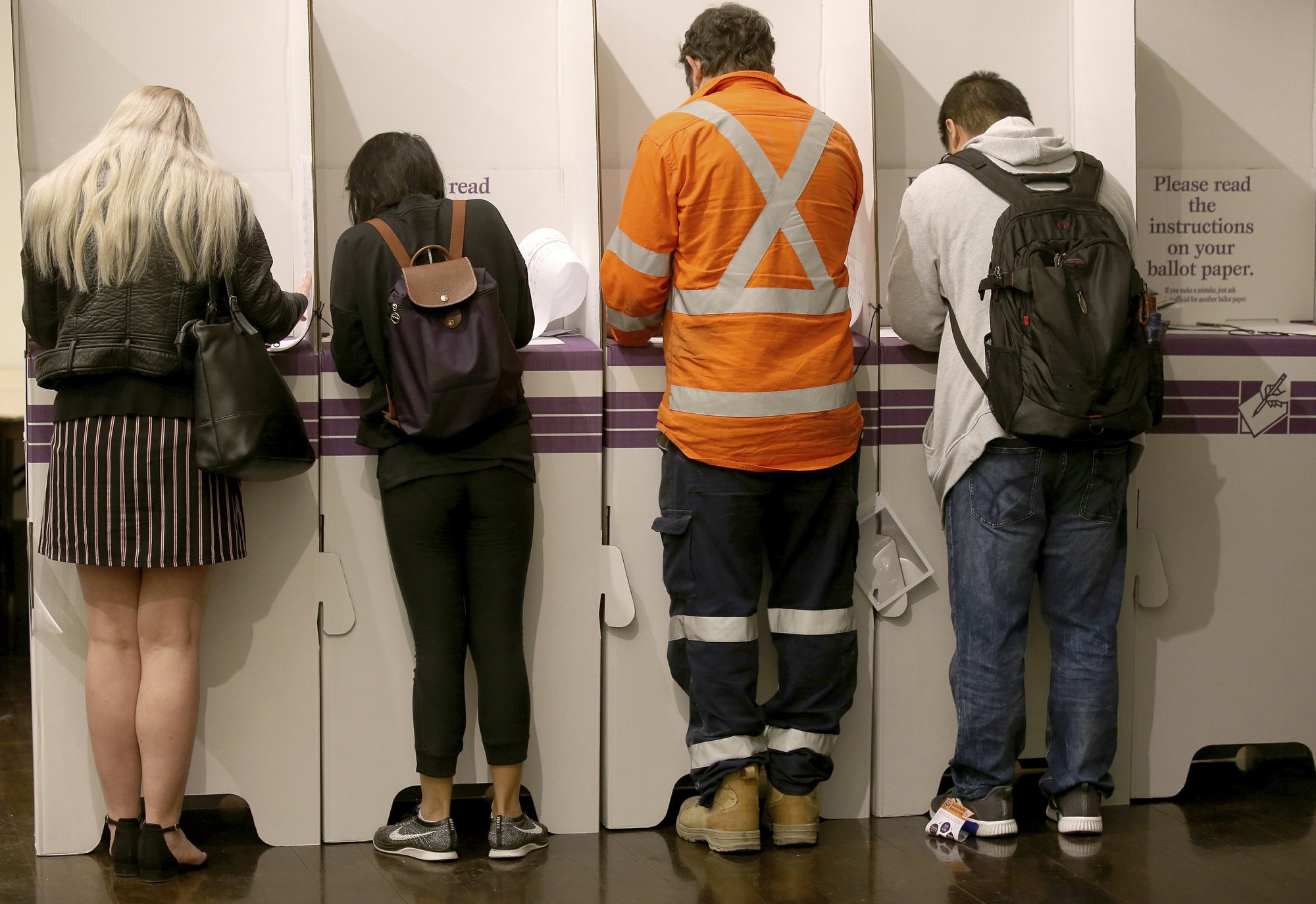
Photo: Voters fill in their ballots at Town Hall in Sydney, Australia, in a federal election, Saturday, May 18, 2019.
Canberra, May 18 : Political leaders continued frenetic 11th-hour campaigning as Australians vote on Saturday in an election likely to deliver the nation’s sixth prime minister in as many years.
Opinion polls suggest the conservative Liberal Party-led coalition will lose its bid for a third three-year term and Scott Morrison will have had one of the shortest tenures as prime minister in the 118-year history of the Australian federation.
Morrison is the conservatives’ third prime minister since they were first elected in 2013. He replaced Malcolm Turnbull in a leadership ballot of government colleagues in August.
Morrison began the day campaigning in the island state of Tasmania in seats he hopes his party will win from the center-left Labor Party opposition. He then flew 900 kilometers (560 miles) home to Sydney to vote and to campaign in Sydney seats.
Opposition leader Bill Shorten contained his campaigning to polling centers in his home town of Melbourne where he voted Saturday morning with his wife Chloe Shorten.
Shorten said he was confident Labor would win government and promised to start governing from Sunday. He said his top priorities would be to increase wages for low-paid workers, increase pay rates for working Sundays and reduce Australia’s greenhouse gas emissions.
“The world will know that if Labor gets elected, Australia’s back in the fight against climate change,” Shorten told reporters.
Shorten has been campaigning hard on more ambitious targets to reduce Australia’s greenhouse gas emissions.
Australia is the world’s largest exporter of coal and liquefied natural gas. It is also one of the world’s worst carbon gas polluters per capita because of a heavy reliance on coal-fired electricity.
As the driest continent after Antarctica, it is also particularly vulnerable to the impacts of climate change, such as wildfires and destructive storms.
The government has committed Australia to reduce its emissions by 26% to 28% below 2005 levels by 2030. Labor has promised a 45% reduction in the same time frame.
Shorten, a 52-year-old former labor union leader, has also promised a range of reforms, including the government paying all the patients’ costs for cancer treatment and a reduction of tax breaks for landlords.
Morrison, a 51-year-old former tourism marketer, said he had closed Labor’s lead in opinion polls during the five-week campaign and predicted a close result.
“It’s not the time to engage in Bill Shorten’s big, risky project of big taxes and big spending,” Morrison said.
Morrison promises lower taxes and better economic management than Labor.
An opinion poll published in The Australian newspaper on Saturday put Labor ahead of the conservatives 51.5% to 48.5%.
The Newspoll-brand poll was based on a nationwide survey of 3,038 voters from Monday to Friday. It has a 1.8 percentage point margin of error.
Political analyst William Bowe said it was unclear how the greater support for Labor evident in polls would translate into seats.
He said the conservatives had been “trying to plot a narrow path to victory” by targeting their campaigning on vulnerable Labor seats in Sydney, Tasmania and the Northern Territory.
Neither the ruling coalition nor Labor holds a majority of seats in the House of Representatives, where parties need a majority to form a government. The government lost two seats and its single-seat majority in the lower chamber in blood-letting over the dumping of Turnbull in the face of poor opinion polling.
The government goes to the election holding 74 seats in the chamber that is expanding at this election from 150 seats to 151.
Labor has 69 seats, with independents and minor parties holding the remainder.
Both major parties are promising that whoever wins the election will remain prime minister until he next faces the voters’ judgment. The parties have changed their rules to make the process of lawmakers replacing a prime minister more difficult.
During Labor’s last six years in office, the party replaced Prime Minister Kevin Rudd with his deputy Julia Gillard, then dumped her for Rudd.
Polling on Australia’s west coast began two hours after the east coast stations opened. East coast stations will close at 6 p.m. (0800 GMT), two hour before voting ends in the west.
 Weekly Bangla Mirror | Bangla Mirror, Bangladeshi news in UK, bangla mirror news
Weekly Bangla Mirror | Bangla Mirror, Bangladeshi news in UK, bangla mirror news







